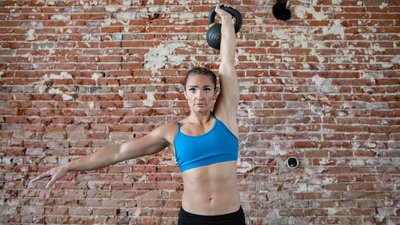CrossFit is everywhere. If you haven't already tried it yourself, you probably know someone who has. Your best friend's girlfriend won't shut up about it. Even your boss heads to the "box" during lunch hour.
Because it's become so popular and many people have achieved impressive results from doing it, it's understandable to be a little bit curious (Don't worry, you're in a safe space. Nobody will judge you). If you want to take up CrossFit, great. However, if walking into a CrossFit gym and actually training there sounds like the third circle of hell to you, I have the solution.
Simply use some of the CrossFit methodology. That way, you can still achieve your goals and mix up your style without setting foot in a box or jumping right in with a bunch of WOD stars and veterans. (For the uninitiated, WOD is an acronym for workout of the day, a CrossFit staple.)
Here are a few strategies you can try:
Strategy 1: Vary Your Training
One of the principles of CrossFit training is that it's "constantly varied." This isn't a new idea. In fact, Arnold himself explained how important it is to expose your body to new types of stimuli.
The human body is incredibly adaptive and responds well to new stimuli after it becomes accustomed to the same training over time. In fitness, this is both a good and a bad thing.
On the bodybuilding side, if challenged correctly, your muscles will adapt to the workouts you put them through by getting bigger, which you want. The same can be said about long-distance running: Continue to run faster and farther, and your body will adapt by increasing its capacity to run.
Now, the difficulty here is that without consistently giving it a reason to overreach, your body just excels at whatever you ask it to do. Repeating workouts with the same weights, week after week, will eventually stall your progress.
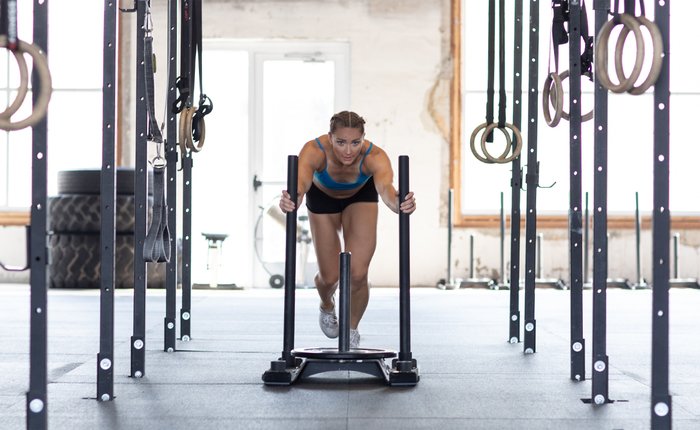
Adaptation is exactly what CrossFit tries to overcome. You won't see the same movements, the same weights, the same rep scheme, or the same time domain every time. The body is constantly being challenged in new ways to avoid plateaus.
This can often be too random for goals with hypertrophy or strength, but you can still perform the same workout consistently and be sure to progress the weights and reps, or change the movements each time.
For example, don't just do the same 3 sets of 15 reps of dumbbell biceps curls every week. Instead, try EZ-bar curls, barbell curls, or cable curls. Perform varying numbers of sets and reps and vary your position: Curl standing up, curl sitting down, or curl laying down.
Strategy 2: Don't Look to Specialize
This goes along with the varied-training component. When you train CrossFit, the main goal is to increase your work capacity across multiple domains. Meaning you're training to get better at pretty much everything, not be the best at one thing.
To a CrossFit coach and athlete, the person who is the most "fit" is the person who could compete in a 5K run, powerlifting meet, rope-climbing contest, and swim meet and come in fifth at each competition. He or she may not necessarily win any of them, but could place well in each one.
Someone who's a diehard runner might win the 5K but finish dead last in the powerlifting meet. After all, that's not where the majority of their efforts are placed. The training demands for each modality are highly specialized and often don't involve each other at all.
Obviously, if you're trying to get onstage for a bodybuilding show or train for a powerlifting meet, being a jack of all trades is not what you're after. However, if you're in the gym to get generally fitter and healthier and have some variety, then you may want to take a leaf out of the CrossFit book.
To make this work in your own training, switch up what you do every day. One day, go for a long run. On another day, work up to a heavy set of 5 deadlifts. On the third day, do a tough circuit. The choices are endless, and that's part of the fun!
Strategy 3: Do More Multijoint Exercises
Another important aspect of being a CrossFitter is learning to move your body as a whole system. In the traditional sense, most of us learned to work out using one joint at a time. Meaning, the "usual" chest/back/legs/shoulders/arms split makes you move one part of your body per workout.

Instead of working one body part at a time, use your entire body. For example, rather than keeping your leg-day exercise limited to leg extensions, curls, calf raises, and leg presses, add squat or deadlift variations. For shoulder work, add a push press. Or if you dare, try adding power cleans or overhead squats to your weekly workout routine.
Once you take the time to learn proper technique and practice the movements, the benefits are many. Full-body exercises load the skeletal muscle, which means even your bones get stronger as you do them. Strong bones only become more important as we age.
Multijoint exercises also encourage your brain and body to work together in new ways. Getting your body to do what your brain wants is an actual skill. This skill is hugely advantageous in anything you do, from the playing field to the gym to everyday tasks.
Whether you are working out to lose weight or to build muscle, these big lifts are also great because they work almost your entire body at one time. Which means you're doing more work in fewer movements.
Strategy 4: Use More Equipment, Not Machines
CrossFitters do a lot of work with different equipment: barbells, dumbbells, kettlebells, rings, medicine balls, body weight, axel bars, sandbags. Nothing is off limits. If this appeals to you, have at it!
That means machine users should head over to the free-weight section instead. While machines can be helpful in keeping your body from using incorrect form, they're also quite limiting if they're the only way you're working your muscles.
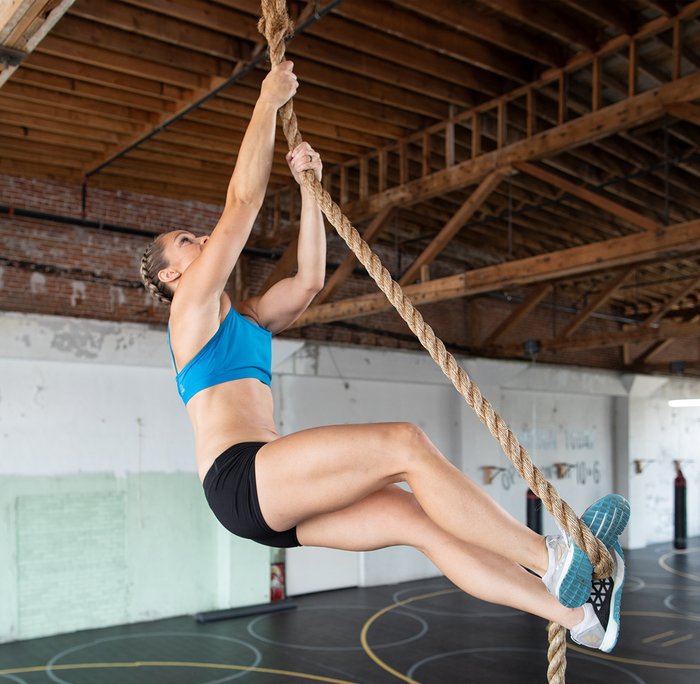
Again, unless your goal is to do a bodybuilding competition, you should want your body to be strong and fit in its entirety. Each new piece of equipment will challenge your body and mind in a new way and increase your body's capabilities. By exposing it to new stimuli and allowing it the freedom to move in space, you're also giving yourself the opportunity to learn how to stabilize yourself, move properly on your own, and be strong through all planes of motion: front, back, and side to side.
Strategy 5: Increase Your Intensity
The clock plays an interesting role in CrossFit. Most of the time, workouts are done for time, with the goal of doing as much work as possible within a specific allotment. Keeping yourself on a clock can help make workouts more difficult, which goes a long way in helping you achieve muscular endurance, work capacity, fat loss, and even strength.
You may go to the gym, but whether you use your time as effectively as possible is often a different story. Socializing more than you move, constantly scrolling on your phone, going through the same motions week after week—all are sure signs you need to up the ante.
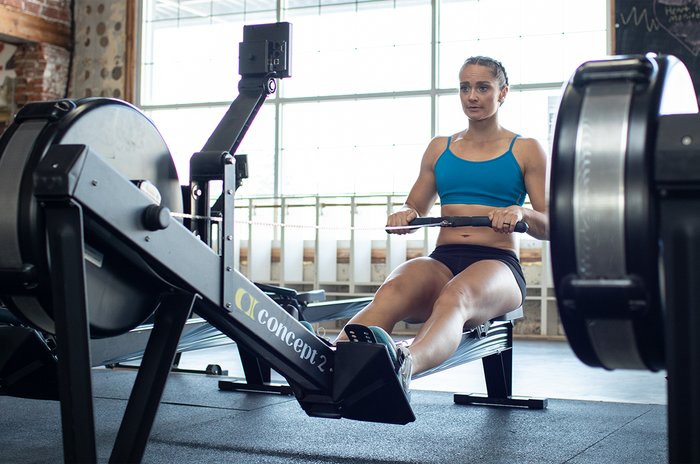
And look, I get it: Not everybody wants to work so hard they drool. But what you can do is examine the effort you're putting into your workout. Are you breathing hard? Are you sweating? Are you challenging yourself every time you go to the gym? Most fitness goals require the answers to those questions to be "yes."
You can make your workouts more difficult by timing your rest periods—give yourself no more than 60-90 seconds. You can also see how many reps you can do in one minute and try to beat that every time after, or consistently increase the amount of weight you're using. If the last couple reps of your set feel the same as the first couple, pick up a heavier dumbbell.
Strategy 6: Learn New Skills
One of my personal favorite ideas in CrossFit is "regularly learn new sports." You can and should train your body to meet whatever goal you have for it. But, it's important to remember you probably won't be a professional in one sport and your body is the only one you have. Give it the opportunity to move in new ways.
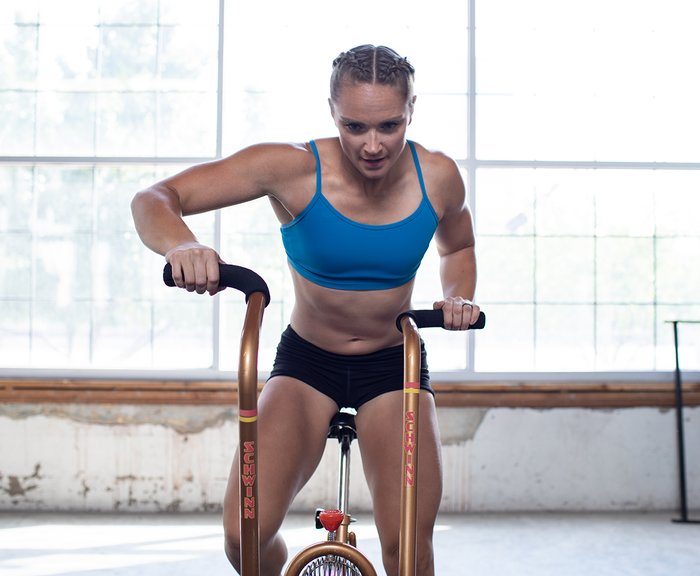
And this doesn't necessarily mean you have to do only the sports mimicked in CrossFit to apply this concept. If you've never picked up a tennis racket, try it! Play sand volleyball with your friends, sign up for a city league soccer team, or hit some golf balls on the range.
Your training doesn't have to be limited to the gym. Go play!

